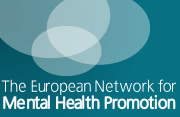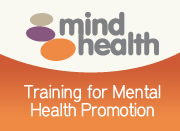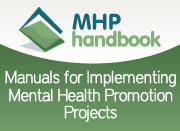Tools
- Utilities:
- Print this page
- Send this page
- Font size:
- Increase font size
- Decrease font size
Newsletter Issue No. 8
23/04/2009 - Submitted by: Tilia Bousios
Publisher: ProMenPol Consortium
European Parliament resolution on Mental Health of 19th February 2009
In follow-up to the establishment of the European Pact for Mental Health and Well-being, on 19 February 2009 the European Parliament has adopted unanimously the motion for a resolution on Mental Health. The report, which was presented by Evangelia Tzampazi MEP, Rapporteur for the Committee on the Environment, was under discussion since last November.
The ProMenPol project’s partner Mental Health Europe (MHE) has been engaged in the draft of the document and has tabled some amendments that have been successfully integrated into the report.
In its resolution, the European Parliament supports the Pact’s call on the EU institutions, the Member States and key actors and players to cooperate and take actions on five priority areas for the promotion of the mental health and well-being of the population, combating stigma and social exclusion, strengthening preventive action and self-help and providing support and adequate treatment to people with mental health problems and to their families and carers.
The Parliament encourages the establishment of a multi-stakeholder consultative Platform to implement the European Pact, involving service users, families, carers, NGOs and academics. It also calls on the Member States to support the strengthening of organisations which represent service users and carers in order to facilitate their participation in the formulation and implementation of policy and in all stages of research into mental health.
An important issue highlighted in the report is the call for the adoption of common European guidelines defining disability in accordance with the provisions of the United Nations Convention on the Rights of Persons with Disabilities. The European Parliament also endorses the Commission proposal for a new directive against discrimination on the basis of religion or beliefs, disability, age or sexual orientation beyond the employment sector and its call for the immediate adoption of this directive in order effectively to protect persons with mental health problems from discrimination.
The European Parliament’s initiative has to be welcomed as a key step forward in the implementation of the Pact for Mental Health and Well-being. Even so, the adopted text still puts too much focus on mental illness rather than on the promotion of positive mental health and wellbeing.
The final text of the resolution is available on the European Parliament’s website
For further information about MHE policy work on the European Parliament’s resolution on mental health, please contact Mari Fresu, Health Policy Officer.
Merger of Stakes and KTL - Finland
THL has a wide range of tools to carry out its responsibilities: research, follow-up and evaluation, development, expert influence, official tasks as well as international co-operation.
THL seeks to serve the broader society in addition to the scientific community, actors in the field and decision-makers in central government and municipalities.
The new National Institute for Health and Welfare was formed in the beginning of 2009 through the merger of the National Public Health Institute (KTL) and the National Research and Development Centre for Welfare and Health (STAKES). It operates under the Ministry of Social Affairs and Health. The starting points for establishing the new Institute were the needs of the population and the health and social service system as well as the need to join forces to step up work to promote health and welfare in Finland.
The mission of our new National Institute for Health and Welfare is to promote the well-being and health of the population, prevent diseases and social problems, and to support social and health services. THL carries out its responsibilities through a wide range of activities: research, evaluation and follow-up, development work, expert influence, centralised national services as well as international co-operation. THL is also a statutory statistical authority in health and welfare and maintains and provides a strong knowledge base within its field.
THL seeks to serve the broader society in addition to the scientific community, actors in the field and decision-makers in central government and municipalities.
Promotion of health and well-being as well as supporting and developing the service system and service contents are among the central tasks of the new Institution. The Department of Mental Health and Substance Abuse Services has four units with altogether 70 experts working in the field of mental health.
Review of the ProMenPol Framework - What to Expect Next
One of the major achievements of ProMenPol has been to produce a framework for describing and categorising mental health promotion tools for each of the three settings of interest. This framework has been used as the basis for the ProMenPol tools database.
The initial version of the framework was based on the WHO’s ICF (International Classification of Functioning) framework and on a typology of mental health promotion developed by the project team. Since this was the first time that such a framework had been developed, the initial framework was perhaps over inclusive and more complex than it needed to be.
However, following feedback from users and an analysis of the ProMenPol teams’ experiences of using it, the framework is now undergoing redesign so that it has more functionality and is easier to use. It will be used as a basis for amending the tools database and will provide a more useful and simpler database for ProMenPol users. It will be available on the website from early summer 2009.
In parallel with the redesign of the database, the ProMenPol toolkit will undergo significant amendment also. Some of the main improvements will be:
- Better links to the tools database
- Provision of step-by-step instructions on how to implement mental health promotion in each of the three settings
- Advice on overcoming common barriers to implementing MHP
- Links to examples of good practice
- Links from the tools to examples of their implementation (where available)
The ProMenPol team hopes that these improvements will improve the utility of the toolkit and will make it easier for users to use. We would like to extend our thanks to all who have contributed feedback to us so that we can build the improved version.
Lessons Learnt from the ProMenPol Field Trials
The ProMenPol project is a feedback process whereby results from practice and policy are included in the state-of-the-art. Up until now, we have received nearly forty Field Trial type I responses which gives us essential user feedback on the database and the toolkit with tools and instruments in the field of mental health promotion from practice. Overall, the results are very positive with regard to the toolkit and database and they have proved to be very useful with regard to making improvement. This feedback formed the basis for a ProMenPol workshop where key elements for the improvement of the homepage and the database were discussed. An amended webpage and database is now in development and will be available by the early Summer.
We plan to include user feedback throughout the lifetime of the project. This can be done through undertaking a Field Trial (type I), the so called Usabiity Test. After the summer of 2009, we will ask users to complete a second questionnaire in order to evaluate the improvements made in the database and the homepage.
In addition several organisations are currently implementing a specific mental health promotion tool in Type II Field Trials. They are doing mental health promotion in schools, workplaces and residences for older people. We will be happy to hear from other organisations who want to express their interest in implementing a mental health promotion tool by filling in the Expression of Interest Form. All practitioners who already have expressed their interest are welcome to announce their plans giving us a summary of their intention. Gert Lang of the Research Institute of the Red Cross will provide you with the necessary information.
Furthermore we already have five organisations who have reported to the ProMenPol project about their previous implementation experiences. These Field Trial Type III responses come from four workplaces and one school. They reported to us that their mental health promotion project has been “(very) good” and several helpful factors supported the implementation process such as supportive management and organisation and also supportive staff. Nevertheless several organisations reported barriers and constraints which led to changes during the implementation process. Most of them reached the objectives of the mental health promotion action and they were happy with the performance of the mental health promotion tools that they used.
In addition practitioners have learned a lot from the implementation practice and they have identified important opportunities for mental health promotion in the future, such as the development of fruitful collaborations, support and health gains. They also recognise that persistent obstacles can shorten the usefulness of mental health interventions. Our initial analysis reveals that practitioners wish for an improvement in existing MHP programs, more education and training opportunities, better communicated evidence and discussion groups for policy.
These first results show that good policy recommendations need more knowledge and experience gained from practice. We hope that ProMenPol can motivate additional practice organisations to give us insights into their experiences of implementing mental health tools during the rest of the project. Please tell us if you already have implemented a mental health promotion tool in practice. You can do so by contacting us.
The 3rd Annual ProMenPol Conference
The 3rd Annual ProMenPol Conference will take place on October 15th to 16th 2009 in Berlin at the offices of the Federal Institute for Occupational Health and Safety.
At the last annual conference, lessons learned from practice will be the main focus of the agenda. ProMenPol will present results from the Mental Health Promotion Field Trials in general and in particular a good-practice example from each of the ProMenPol settings (education, workplace, and older people’s residences). The presentations will form the basis for discussing the advantages and disadvantages of evidence-based and good-practice results as well as its perception in the sphere of policy, practice and research. To support policy through practice, the conference will address both policy makers and practitioners in order to foster information exchange.
The project will also will present latest developments concerning its classification system for mental health promotion tools and at that point newly launched ProMenPol toolkit.
Invitations will be sent out in the first part of July. If you wish to take part or find out more about the conference, contact Rena Hohenstein from BAuA
European Commission’s Funding Opportunities in Health: Call 2009
On 27 February 2009, the European Commission adopted the Work Plan for 2009 for the implementation of the second programme of Community action in the field of health. The Work Plan was followed by the publication of the calls for proposals that present new funding opportunities for European organisations active in the area of public health.
The EAHC published calls for proposals for projects, operating grants, conferences and joint actions. The total budget available for the execution of the 2009 Work Plan is about 48.2 million euro. All proposals should address important problems in the European public health, including mental health related issues, and be in line with the Commission's priorities expressed in the Work Plan.
The deadline for the submission of proposals is 20 May 2009. For more information, visit the website of the Executive Agency for Health and Consumers.
The Future of ProMenPol
We are coming to the stage of the project when we must consider what will happen when the project finishes in December 2009. Feedback from various sources to date indicates that many of you would like to see the project continue in some form – it is our task to consider how that might be achieved.
In this issue we propose two ways in which this might be done. The first concerns setting up a Mental Health Promotion Network while the second (and these are not exclusive options) involves setting up an online journal.
In the print version of this Newsletter you will find a questionnaire with a number of questions which address these issues. We would be grateful if you could complete and save this questionnaire and then send it by e-mail to: Richard Wynne of the Work Research Centre.



